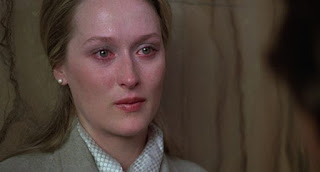I think the 40s is still my favourite decade for films in general - but when it comes to Best Picture Winners then the 70s is the ultimate decade. Most of these films are considered to be absolute classics and are watched regularly around the world today (and so are most of the forty other nominees). I really like all of them except Patton - and I'll concede that Patton had some great things going for it (especially George C Scott and the soundtrack).
There's a real shift in film-making this decade - or at least in "critically-acclaimed" film-making - away from high-budget glamour and whimsy and towards gritty realism. We saw a bit of this in the 60s (In The Heat of the Night, Midnight Cowboy) but, with the arguable exceptions of The Sting and Annie Hall (both still a bit gritty and realistic....) the 70s gives us intelligent, thought-provoking and (sometimes) disturbing drama. There are no more musicals (even near-miss Cabaret is a very different sort of musical) and, apart from the De Niro scenes in G2, every film is set within 50 years of the time it was made. All the films are American (both technically and in spirit) and are set, at least partly, in the US (Patton's speech in front of the flag just about qualifies as a US setting). At least half of the films are strongly connected to contemporary New York.
Also, a lot of these films (and many of the other nominees) are shot mainly or partly on location, rather than on big Hollywood lots. There are several examples of scenes that were shot very early in the morning on city streets (possibly without the proper permits), and glimpses of bystanders who were probably quite surprised to find they ended up in an Oscar-winning film. (The French Connection and Rocky are probably the best examples of this....).
I have really enjoyed this decade - if enjoyed is the right word for some of these films. It is with great reluctance that we move on to the 80s, where flashy capitalism and an increased reliance on personal therapy looks set to derail a lot of what the 70s gave us!
My Top Ten (as they stand today!) is as follows:
1. The Godfather
 2. One Flew Over The Cuckoo's Nest
2. One Flew Over The Cuckoo's Nest3. The Sting
4. The Godfather Part II
5. The Deer Hunter
6. Rocky
7. Annie Hall
8. The French Connection
9. Kramer vs Kramer
10. Patton
Best Picture
Nominees:
The Godfather
The Sting
One Flew Over The Cuckoo's Nest
The Godfather Part II
The Deer Hunter
And the winner is.....
The Godfather
I know it's obvious, but it's that good. Better than the sequel (although the De Niro parts of the sequel match it well). I've seen it half a dozen times now and it gets better every time I watch it. It's long, serious, hard-hitting, violent and grim in parts - but always compelling and (weird but true) very enjoyable. It's right up there on my all time list!
 Best Director
Best DirectorNominees:
Francis Ford Coppola (The Godfather 1 and 2)
George Roy Hill (The Sting)
Milos Forman (One Flew Over The Cuckoo's Nest)
Michael Cimino (The Deer Hunter)
And the winner is.....
Francis Ford Coppola
Two Godfathers - no contest!
Best Actor
Nominees:

Jack Nicholson (One Flew Over The Cuckoo's Nest)
Robert De Niro (Godfather 2, The Deer Hunter)
John Cazale (Godfather 1 and 2, The Deer Hunter)
Christopher Walken (The Deer Hunter)
Paul Newman (The Sting)
George C Scott (Patton)
And the winner is.....
Jack Nicholson
It's a tough category - hence six nominees (and no Pacino). But Jack gets it because he acts his socks off all the way through Cuckoo's Nest without ever getting in the way of the other great performances. Even though he has often over-acted his way through the last four decades, when he gets it right he gets it very right indeed.
 Best Actress
Best ActressNominees:
Diane Keaton (Godfather 1 and 2, Annie Hall)
Talia Shire (Godfather 1 and 2, Rocky)
Meryl Streep (The Deer Hunter, Kramer vs Kramer)
Louise Fletcher (One Flew Over The Cuckoo's Nest)
And the winner is.....
Louise Fletcher
Actually not as rich a category as I thought it would be, as most of the great female performances of the 70s were in non-winning films. The winners in this decade were not female focussed films. Three women - Keaton, Shire and Streep - had significant roles in more than one winner, and were good in those roles (although I still can't work out what Talia Shire did in G2 that was worthy of a nomination over Diane Keaton!).
However, I'm giving this to Louise Fletcher. Playing against Nicholson in *that* role and holding her own. Her performance is a masterclass in restraint - she acts more in what she doesn't do than what she does.
Best Non-Winning Picture
Nominees:
Cabaret
Star Wars
M*A*S*H
Dog Day Afternoon
(I could go on - lots of great films in the 70s!)
And the winner is.....
Cabaret
This is probably sentiment as much as anything, but I love this film. I'm not saying it should have won - I don't think there are many examples in this decade of the Academy getting it spectacularly wrong. Clearly The Godfather was the right choice that year, but Cabaret ran it a close second!
Worst Picture
Nominees:
Patton
And the winner is.....
Patton
There's only one dud in the whole decade. And even in Patton, I rate the acting very highly - just don't really like the film.
















